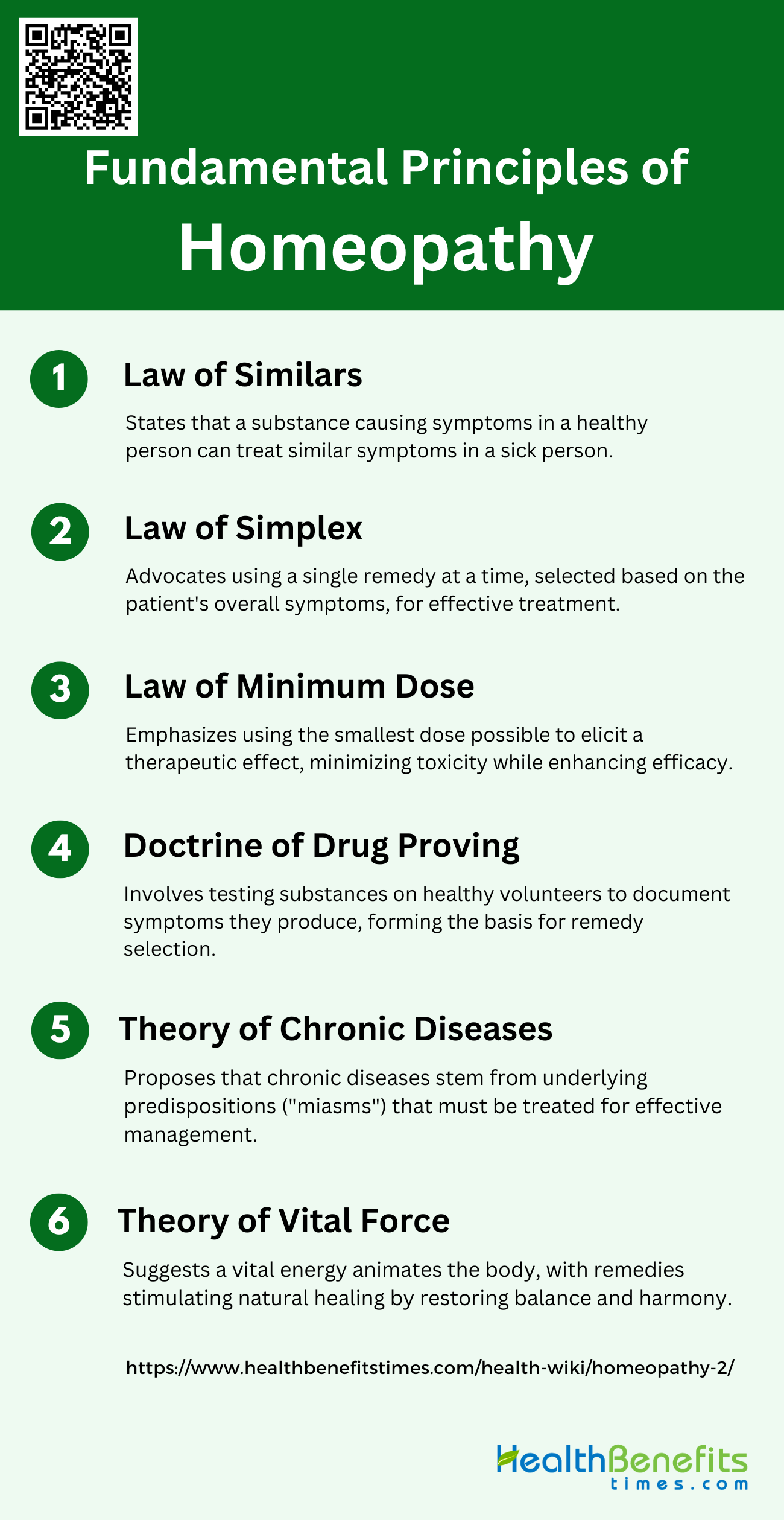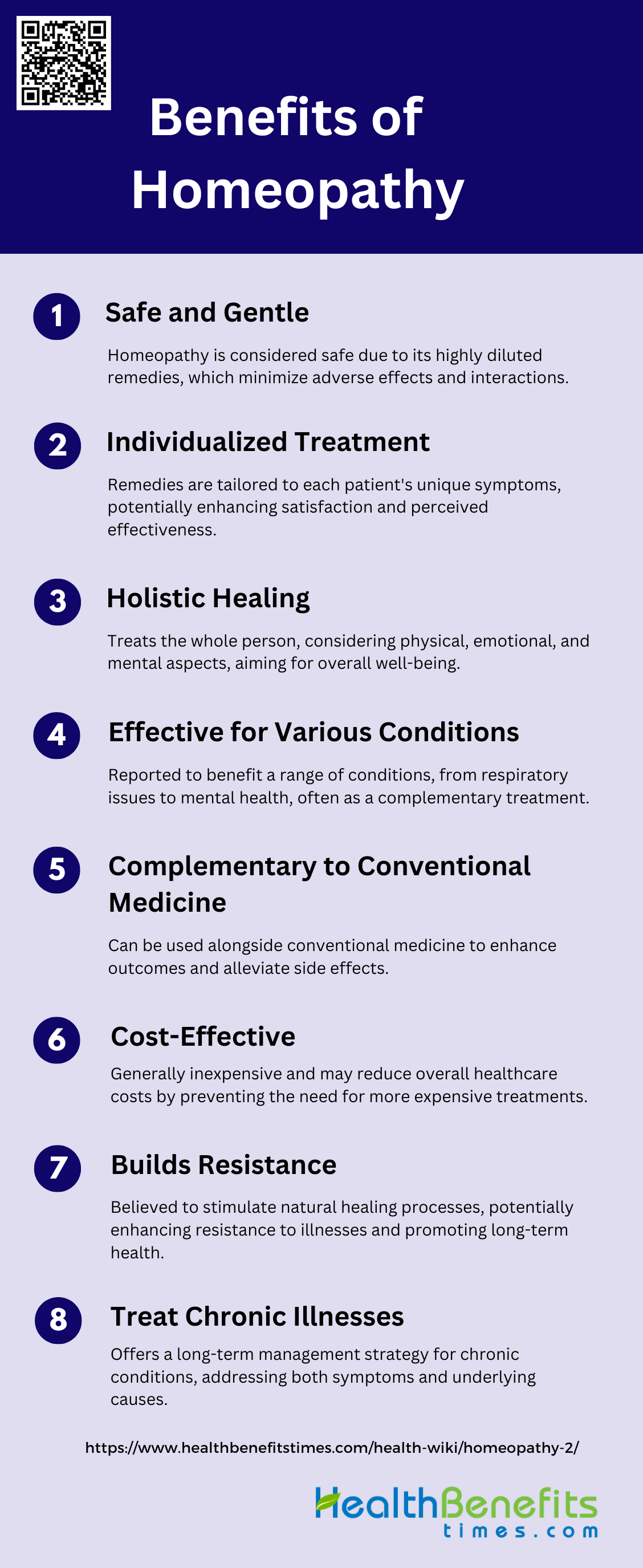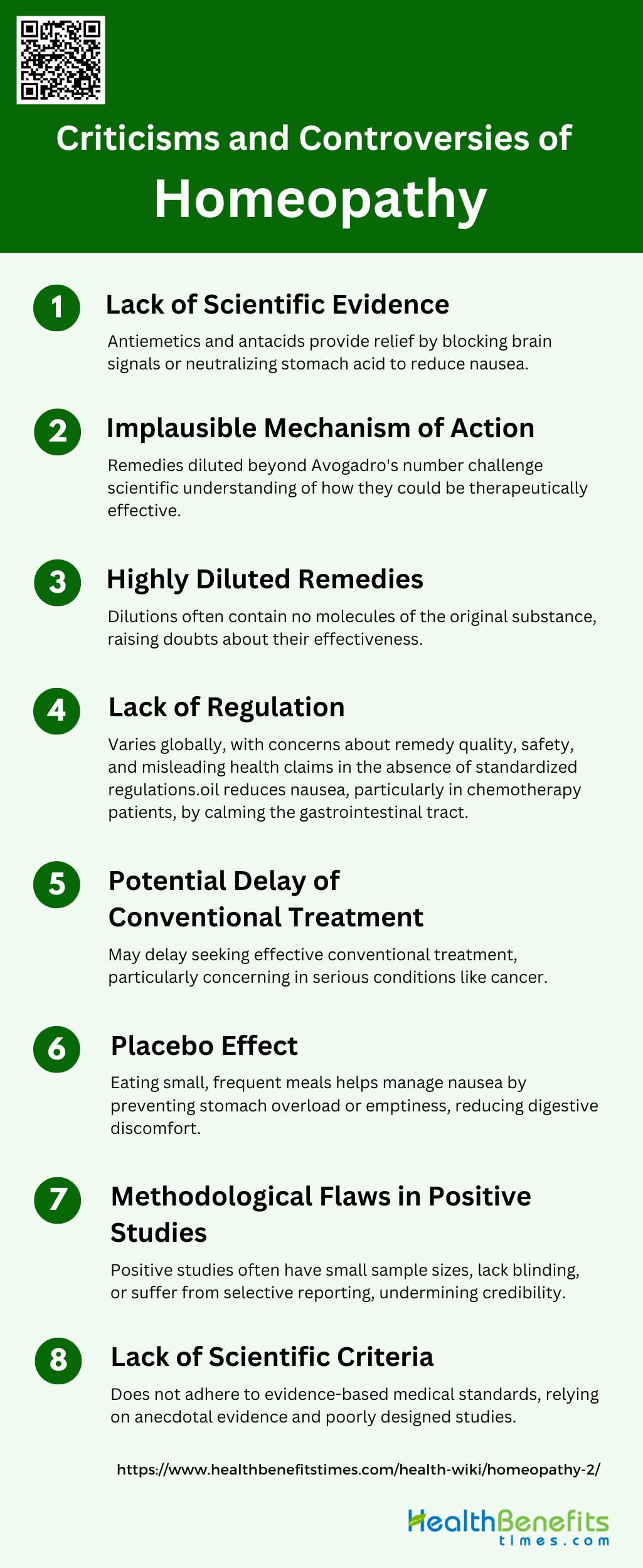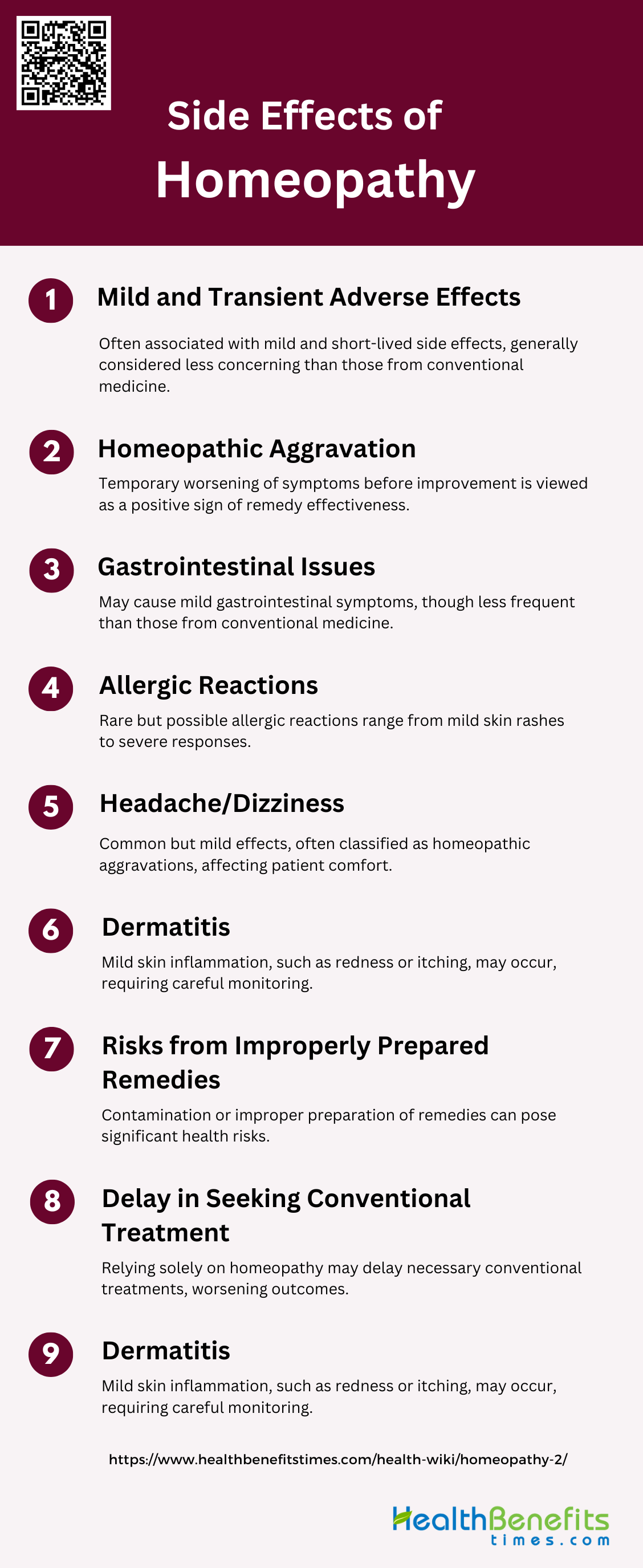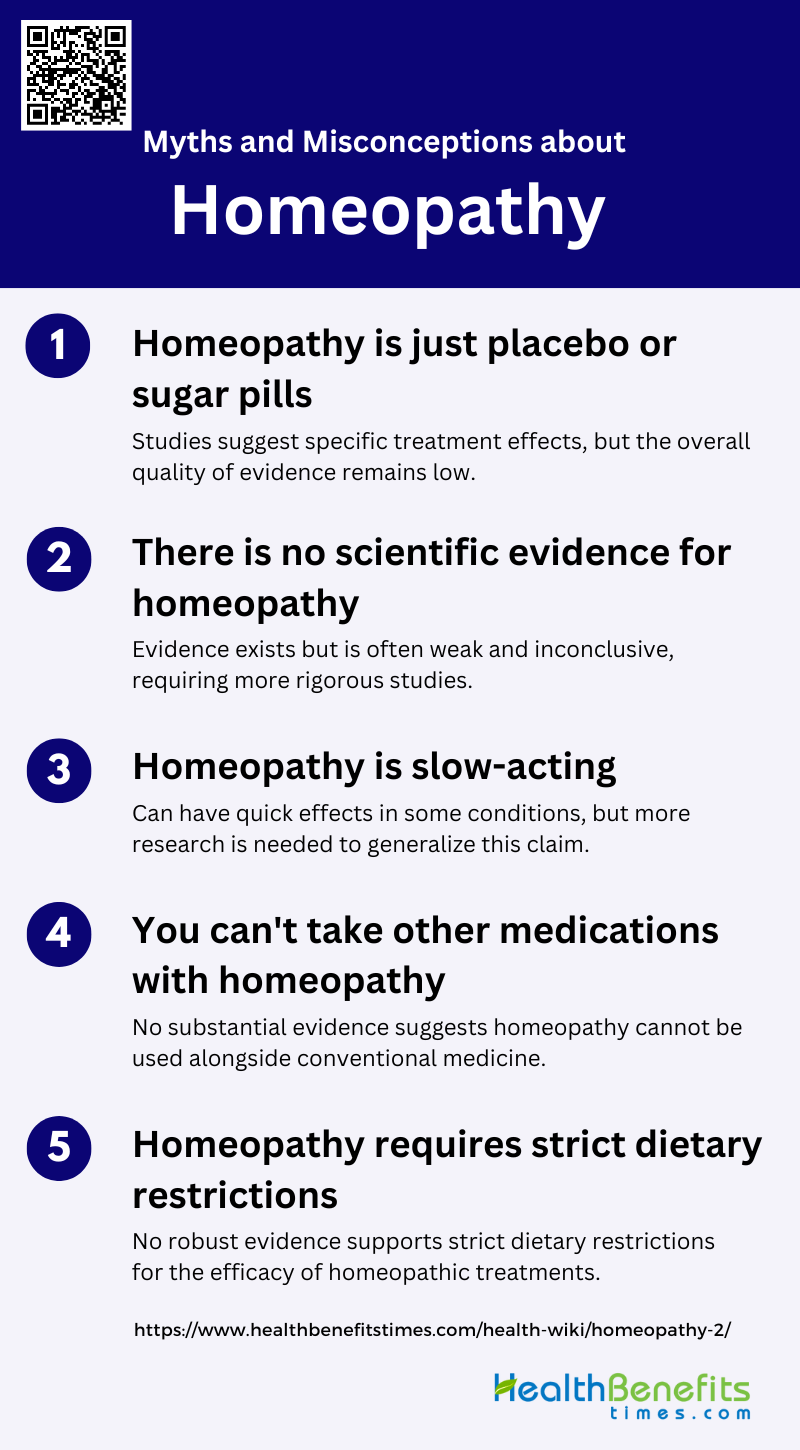Homeopathy is an alternative medical system founded by Samuel Hahnemann in the late 18th century, based on the principle of “let like be cured by like”. This approach to healing suggests that substances which cause symptoms in healthy individuals can be used in highly diluted forms to treat similar symptoms in sick patients. Homeopathy gained popularity in the 19th century, particularly due to its reported success in treating epidemics, and has experienced a resurgence in recent decades. Despite its controversial nature, primarily due to the use of extremely diluted remedies, homeopathy has shown resilience and geographical widespread adoption. The practice involves individualized treatments, taking into account the patient’s overall constitution and symptoms, rather than focusing solely on diagnosing and treating specific diseases. While homeopathy remains a subject of scientific debate, some clinical research, including randomized trials and meta-analyses, suggests that its effects may extend beyond placebo.
Fundamental principles of Homeopathy
Homeopathy is a holistic system of medicine that operates on several core principles aimed at stimulating the body’s natural healing processes. These principles guide the selection and administration of remedies, ensuring that treatment is tailored to the individual’s specific symptoms and overall health. Below are the fundamental principles that form the foundation of homeopathic practice:
1. Law of Similars
The Law of Similars, or “Similia Similibus Curentur,” is the foundational principle of homeopathy, formulated by Samuel Hahnemann in the late 18th century. This principle posits that a substance causing symptoms in a healthy person can be used to treat similar symptoms in a sick person. Hahnemann’s hypothesis emerged from his observation that Cinchona bark, which caused malaria-like symptoms in him, was used to treat malaria. He extended this idea to other substances, conducting experiments known as “provings” to document the symptoms they produced in healthy individuals. These findings were then used to match remedies to patients’ symptoms, forming the basis of homeopathic treatment.
2. Law of Simplex
The Law of Simplex advocates for the use of a single remedy at a time in homeopathic treatment. This principle is rooted in the belief that administering one carefully selected remedy, based on the totality of the patient’s symptoms, is more effective than using multiple remedies simultaneously. The rationale is that a single remedy can more precisely stimulate the body’s vital force to initiate healing. This approach contrasts with conventional medicine, which often employs multiple drugs to address different symptoms or conditions concurrently. The simplicity of this method aims to avoid potential interactions and ensure a clear understanding of the remedy’s effects on the patient.
3. Law of Minimum Dose
The Law of Minimum Dose is a core tenet of homeopathy, emphasizing the use of the smallest possible dose to elicit a therapeutic effect. Hahnemann developed this principle to minimize the toxicity of treatments. He discovered that diluting substances in a series of steps, each followed by vigorous shaking (succussion), could enhance their therapeutic properties while reducing harmful side effects. This process, known as potentization, is believed to extract the “vital essence” of the substance. Despite skepticism due to dilutions often exceeding Avogadro’s number, many homeopaths report clinical efficacy with these highly diluted remedies, though the mechanism remains scientifically controversial.
4. Doctrine of Drug Proving
The Doctrine of Drug Proving involves testing substances on healthy volunteers to document the symptoms they produce. This systematic approach, initiated by Hahnemann, is essential for identifying the therapeutic potential of homeopathic remedies. Volunteers, known as “provers,” take repeated doses of a substance and meticulously record their symptoms. These symptom profiles, or “drug pictures,” are then compiled into homeopathic materia medica. When treating patients, homeopaths match the patient’s symptoms with the drug picture of a remedy, adhering to the Law of Similars. This method ensures that remedies are selected based on comprehensive and empirical symptomatology.
5. Theory of Chronic Diseases
Hahnemann’s Theory of Chronic Diseases, or “miasms,” proposes that chronic diseases are caused by underlying, often inherited, predispositions. He identified three primary miasms: Psora, Syphilis, and Sycosis, each associated with specific symptom patterns and disease tendencies. According to this theory, effective treatment requires addressing these deep-seated miasms rather than just alleviating surface symptoms. Homeopathic remedies are selected to target these miasms, aiming to eradicate the root cause of chronic conditions. This holistic approach contrasts with conventional medicine, which often focuses on symptomatic relief rather than underlying causes.
6. Theory of Vital Force
The Theory of Vital Force is a central concept in homeopathy, positing that a vital energy or life force animates the body and maintains health. Hahnemann believed that disease arises from disturbances in this vital force, and that homeopathic remedies work by stimulating the body’s innate healing mechanisms. The vital force is thought to respond to the remedy by restoring balance and harmony within the organism. This concept underscores the holistic nature of homeopathy, where treatment is aimed at the whole person rather than isolated symptoms. The vital force theory aligns with the broader homeopathic philosophy of treating the individual as an integrated whole.
How Homeopathy Works
Homeopathy is a form of complementary medicine that operates on the principle of “like cures like,” where substances that cause symptoms in a healthy person are used in diluted forms to treat similar symptoms in a sick person. Common homeopathic remedies include plant extracts like Allium cepa (onion) for colds and Pulsatilla (purple coneflower) for respiratory issues, as well as minerals and animal products. The preparation process involves serial dilution and vigorous shaking, known as potentization, which is believed to enhance the remedy’s therapeutic properties despite the high dilution levels often surpassing Avogadro’s number, making the presence of the original substance negligible. This method aims to stimulate the body’s self-healing mechanisms by matching the remedy to the totality of the patient’s symptoms rather than just the disease itself.
Common Homeopathic Remedies
Homeopathy utilizes a variety of natural substances to treat a wide range of ailments, each chosen based on the principle of ‘like cures like.’ These remedies are prepared through a process of serial dilution and succussion, making them safe and effective for various conditions. Below are some of the most commonly used homeopathic remedies:
- Allium cepa: Used for treating symptoms of the common cold, such as runny nose and watery eyes.
- Zingiber officinale: Commonly known as ginger, used for digestive issues and nausea.
- Nux vomica: Often prescribed for digestive problems, headaches, and irritability, especially after overindulgence in food or alcohol.
- Asafoetida: Used for treating irritable bowel syndrome (IBS) with constipation.
- Capsicum frutescens (Malagueta): Used for alleviating menopausal hot flashes.
- Coffea cruda: Derived from unroasted coffee beans, used for treating insomnia and restlessness.
- Agaricus muscaria: Used for treating neurological symptoms and conditions such as tremors and spasms.
- Botulinum toxin: Although more commonly known in conventional medicine, it is also used in homeopathy for treating muscle spasms and other neurological conditions.
Benefits of Homeopathy
Homeopathy offers a holistic approach to healthcare, focusing on treating the individual as a whole rather than just addressing specific symptoms. It is known for its gentle and non-invasive treatments, making it suitable for people of all ages. Below are some key benefits of homeopathy:
1. Safe and Gentle
Homeopathy is often considered a safe and gentle form of treatment. This perception is largely due to the highly diluted nature of homeopathic remedies, which minimizes the risk of adverse effects. According to a systematic review, adverse effects reported in homeopathy are generally limited to temporary worsening of symptoms or the reappearance of old symptoms, which are considered mild and transient. Additionally, homeopathy is promoted as a non-pharmacological intervention, making it a safer alternative for individuals who may be sensitive to conventional medications. This safety profile makes homeopathy an attractive option for many patients seeking gentle and non-invasive treatments.
2. Individualized Treatment
One of the core principles of homeopathy is individualized treatment, where remedies are tailored to the unique characteristics and symptoms of each patient. This approach contrasts with conventional medicine, which often uses a one-size-fits-all methodology. Homeopathy focuses on the patient’s overall experience and symptomatology to determine the appropriate remedy. This individualized approach can lead to higher patient satisfaction and perceived effectiveness, as patients feel their specific needs and conditions are being addressed. The personalized nature of homeopathic treatment is a significant factor in its appeal and perceived efficacy among users.
3. Holistic Healing
Homeopathy aims to treat the whole person rather than just the symptoms of a disease, embodying a holistic approach to health. This method considers physical, emotional, and mental aspects of the patient, aiming for overall well-being rather than merely alleviating specific symptoms. Studies have shown that homeopathic consultations can significantly improve various health outcomes, including mood and pain levels, suggesting that the holistic approach contributes to these benefits. By addressing multiple facets of health, homeopathy seeks to restore balance and promote long-term wellness, making it a comprehensive treatment option.
4. Effective for Various Conditions
Homeopathy has been reported to be effective for a range of conditions, from respiratory and musculoskeletal complaints to mental health issues and cancer care. Clinical trials and reviews have highlighted its potential benefits in treating conditions such as upper respiratory infections, fibromyalgia, and even as an adjunct in cancer care to improve quality of life and survival rates. Although the evidence is mixed and more research is needed, the existing studies suggest that homeopathy can be a valuable complementary treatment for various health issues, enhancing overall patient care.
5. Complementary to Conventional Medicine
This integration can help alleviate side effects of conventional therapies and improve overall treatment outcomes. For instance, studies have shown that homeopathy can improve the quality of life and prolong survival in cancer patients when used as an adjunct to standard cancer treatments. This complementary use allows patients to benefit from the strengths of both conventional and homeopathic medicine, potentially leading to better health outcomes and enhanced patient satisfaction.
6. Cost-Effective
The remedies are generally inexpensive, and the individualized nature of the treatment can lead to fewer overall healthcare costs by potentially reducing the need for more expensive conventional treatments. A review of homeopathy’s role in public health highlighted its potential for cost savings, particularly in managing chronic conditions and reducing the burden on healthcare systems. By offering an affordable alternative or complement to conventional treatments, homeopathy can be an economically viable option for many patients.
7. Builds Resistance
Homeopathy is believed to help build resistance to illnesses by stimulating the body’s natural healing processes. This concept is based on the principle of “like cures like,” where substances that cause symptoms in a healthy person are used in diluted forms to treat similar symptoms in a sick person. Some studies suggest that homeopathic treatments can enhance the immune response and improve overall health, potentially reducing the frequency and severity of illnesses. By promoting natural resistance, homeopathy aims to support long-term health and prevent future ailments.
8. Treat Chronic Illnesses
Research has shown that homeopathy can be beneficial in managing chronic conditions such as rheumatoid arthritis, where it has been found to improve symptoms and quality of life. Additionally, homeopathy’s holistic and individualized approach makes it well-suited for addressing the complex and multifaceted nature of chronic illnesses, providing patients with a comprehensive treatment plan that addresses both symptoms and underlying causes.
Criticisms and Controversies of Homeopathy
Despite its popularity, homeopathy has faced significant criticism and controversy within the medical community. Critics argue that its principles lack scientific basis and that its remedies are no more effective than placebos. Below are some common criticisms and controversies surrounding homeopathy:
1. Lack of Scientific Evidence
Homeopathy has been criticized for its lack of robust scientific evidence supporting its efficacy. Systematic reviews and meta-analyses have generally failed to provide strong evidence in favor of homeopathy. For instance, a systematic review of systematic reviews concluded that there is no convincing evidence that homeopathy is more effective than placebo for any clinical condition. Similarly, a meta-analysis found that while some studies suggest homeopathy might have effects beyond placebo, the evidence is not compelling due to methodological shortcomings and inconsistencies.
2. Implausible Mechanism of Action
One of the most significant criticisms of homeopathy is its mechanistic implausibility. Homeopathic remedies are often diluted beyond the Avogadro limit, meaning they are unlikely to contain any molecules of the original substance. This raises questions about how such remedies could have any therapeutic effect. Critics argue that the proposed mechanisms of action for homeopathy are inconsistent with established scientific principles, making it difficult to accept any positive findings without extraordinary evidence.
3. Highly Diluted Remedies
This practice has been a major point of contention, as it challenges the conventional understanding of dose-response relationships in pharmacology. Critics argue that any observed effects are likely due to placebo rather than the homeopathic remedy itself. Studies have shown that when methodological rigor is applied, the effects of homeopathy do not significantly differ from placebo.
4. Lack of Regulation
The regulation of homeopathic products varies widely across different countries, leading to concerns about the quality and safety of these remedies. In the European Union, for example, the European Academies’ Science Advisory Council has called for a standardized regulatory framework to ensure that health claims made for homeopathic products are consistent with scientific evidence. The lack of stringent regulation can result in the marketing of ineffective or potentially harmful products, further undermining public trust in homeopathy.
5. Potential Delay of Conventional Treatment
One of the most serious criticisms of homeopathy is that it may delay patients from seeking effective conventional treatments. This is particularly concerning in cases of serious illnesses such as cancer. A systematic review found insufficient evidence to support the efficacy of homeopathic treatments in cancer care, raising concerns that reliance on homeopathy could lead to delays in receiving proven medical treatments. This delay can result in worsened health outcomes and increased mortality.
6. Placebo Effect
Many critics argue that the benefits of homeopathy can be attributed to the placebo effect rather than any intrinsic efficacy of the remedies. Meta-analyses have shown that while some studies report positive effects, these are often not significantly different from placebo when methodological rigor is applied. The placebo effect can be powerful, particularly in conditions with subjective symptoms, but it does not justify the use of homeopathy as a primary treatment modality.
7. Methodological Flaws in Positive Studies
Positive studies on homeopathy often suffer from methodological flaws, such as small sample sizes, lack of blinding, and selective reporting. A review of randomized controlled trials found that when only the methodologically best trials were considered, the effects of homeopathy were not significantly different from placebo. These flaws undermine the credibility of positive findings and highlight the need for more rigorous research in this field.
8. Lack of Scientific Criteria
Homeopathy has been criticized for not adhering to the scientific criteria required for medical treatments. The discipline often relies on anecdotal evidence and poorly designed studies, which do not meet the standards of evidence-based medicine. Critics argue that homeopathy should be subjected to the same rigorous testing as conventional treatments to establish its efficacy and safety. The lack of adherence to scientific criteria makes it difficult to integrate homeopathy into mainstream medical practice.
Comparing Homeopathy with Conventional Medicine
How Homeopathy is Used Alongside Conventional Medicine
Homeopathy is often used as a complementary therapy alongside conventional medicine to enhance patient outcomes and improve quality of life. For instance, a study on non-small cell lung cancer (NSCLC) patients demonstrated that additive homeopathy significantly improved both quality of life and survival rates when used in conjunction with conventional anticancer treatments. Similarly, another study found that homeopathy, when used as an adjunct to standard cancer therapy, significantly improved global health status and subjective well-being in cancer patients. These findings suggest that homeopathy can be effectively integrated with conventional treatments to provide holistic care and potentially reduce adverse effects associated with conventional therapies.
Integrative Health Practices and Collaboration with Healthcare Professionals
Integrative health practices involve the collaboration of healthcare professionals from various disciplines to provide comprehensive patient care. The integration of homeopathy into conventional medical practices has shown promising results. For example, a study comparing homeopathy and conventional medicine in primary care settings found that homeopathy was at least as effective as conventional treatments for conditions like respiratory and ear complaints, with fewer adverse events reported. Additionally, the inclusion of homeopathy in integrative veterinary medicine has been advocated to meet the demands of holistic patient care, as seen in the European Green Deal and the EU Organic Regulation. These integrative approaches emphasize the importance of collaboration among healthcare professionals to optimize patient outcomes and expand treatment options.
Discussing Homeopathy with Your Doctor: What to Consider
When discussing homeopathy with your doctor, it is essential to consider several factors to ensure safe and effective treatment. First, inform your doctor about any homeopathic remedies you are using or considering, as this can help avoid potential interactions with conventional medications. Additionally, understanding the principles of homeopathy, such as the individualized approach to treatment and the use of highly diluted substances, can facilitate a more informed discussion. It is also important to consider the evidence supporting the efficacy of homeopathy for specific conditions, as some studies have shown significant benefits, while others remain inconclusive. Lastly, ensure that any homeopathic treatments are administered by qualified practitioners to maintain safety and efficacy.
Choosing a Homeopathy
Selecting the right homeopathic practitioner is essential for effective and safe treatment. It involves considering various factors such as qualifications, experience, and treatment approach. Below are key aspects to consider when choosing a homeopath:
1. Qualifications and Certifications
When selecting a homeopathic practitioner, it is crucial to verify their qualifications and certifications. In the United States, the American Institute of Homeopathy is the oldest organization for licensed health care professionals practicing homeopathy, and there are also licensing organizations for chiropractors, naturopaths, and professional homeopaths who do not hold medical degrees. Given the diverse approaches within homeopathy, from classical to clinical methods, ensuring that the practitioner has received proper training and certification can help in receiving standardized and effective care. Additionally, in countries like Scotland, a significant number of general practitioners have completed basic training in homeopathy, reflecting a growing professional interest and public demand.
2. Questions to Ask Before Choosing a Practitioner
Before choosing a homeopathic practitioner, it is important to ask several key questions to ensure they are a good fit for your health needs. Inquire about their training and certification, as well as their experience in treating conditions similar to yours. Understanding their approach to homeopathy, whether it is classical or clinical, can also provide insight into what to expect from the treatment. Additionally, ask about the duration and frequency of consultations, as homeopathic practitioners often spend more time with patients compared to conventional physicians. It is also beneficial to discuss any potential interactions with conventional medications, as some homeopathic practitioners integrate conventional care into their practice.
3. Understanding Treatment Plans
Understanding the treatment plan proposed by a homeopathic practitioner is essential for effective care. Homeopathy emphasizes individualized treatment based on the totality of symptoms rather than just the disease itself. This means that two patients with the same diagnosis might receive different remedies based on their unique symptom profiles. Treatment plans often involve detailed initial consultations, which can last over an hour, and infrequent doses of a single remedy. It is also important to be aware of the potential for adverse effects, even though homeopathic remedies are generally considered safe due to their high dilutions. Discussing the expected duration of treatment, follow-up consultations, and any necessary lifestyle changes can help in setting realistic expectations and achieving better health outcomes.
Side Effects of homeopathy
Homeopathy is generally considered safe, but like any form of treatment, it can have side effects. These are usually mild and temporary, but it’s important to be aware of them. Below are some potential side effects of homeopathy:
1. Mild and Transient Adverse Effects
Homeopathic treatments are often associated with mild and transient adverse effects. These effects are generally short-lived and not severe, making them less concerning compared to those from conventional medicine. A systematic review and meta-analysis of randomized controlled trials found that more than two-thirds of the reported adverse effects were classified as grade 1, indicating mild severity. Another study confirmed that the majority of adverse effects reported were minor, suggesting that the risk connected to homeopathic treatment is relatively low. Despite their mild nature, these effects are important to monitor for patient safety.
2. Homeopathic Aggravation
Homeopathic aggravation is a unique concept in homeopathy, referring to a temporary worsening of symptoms before improvement occurs. This phenomenon is considered a positive sign that the remedy is working. A systematic review found that homeopathic aggravations were reported in 12% of trials, with most classified as mild. Another study indicated that two-thirds of reported reactions were homeopathic aggravations, with 73% being minor and 27% moderate. Although these aggravations are generally less severe than adverse effects, distinguishing between the two is crucial for accurate risk assessment.
3. Gastrointestinal Issues
Gastrointestinal issues are among the adverse effects reported in homeopathic treatments. These can include symptoms like nausea, vomiting, and diarrhea. A meta-analysis of observational studies found that gastrointestinal issues were among the adverse effects reported, although they were less frequent compared to those from conventional medicine. Another study highlighted that while homeopathic remedies can cause adverse effects, these are generally mild and transient, including gastrointestinal symptoms. Monitoring these effects is essential to ensure patient safety and comfort during treatment.
4. Allergic Reactions
Allergic reactions to homeopathic remedies, although rare, have been documented. These reactions can range from mild skin rashes to more severe responses. A systematic review noted that adverse effects, including allergic reactions, were reported in 68% of trials. Another study emphasized the importance of identifying and classifying these reactions to ensure patient safety. While the frequency of allergic reactions is lower compared to conventional medicine, they still pose a risk that needs to be managed carefully.
5. Headache/Dizziness
Headache and dizziness are common adverse effects associated with homeopathic treatments. These symptoms are usually mild and transient. A cross-sectional study found that headache and dizziness were among the symptoms reported by patients after taking homeopathic remedies, often classified as homeopathic aggravations. Another review confirmed that these symptoms are part of the mild adverse effects commonly reported in homeopathy. Although not severe, these symptoms can affect patient comfort and should be monitored.
6. Dermatitis
Dermatitis, or skin inflammation, is another potential adverse effect of homeopathic treatments. This can manifest as redness, itching, or rash. A systematic review and meta-analysis found that skin reactions, including dermatitis, were among the adverse effects reported in homeopathic trials. Another study highlighted the need for careful monitoring of skin reactions to distinguish between mild adverse effects and more serious conditions. While generally mild, dermatitis can be uncomfortable and requires appropriate management.
7. Risks from Improperly Prepared Remedies
Improperly prepared homeopathic remedies can pose significant risks to patients. These risks include contamination, incorrect dilution, and improper storage, which can lead to adverse effects. A review emphasized the importance of stringent quality control measures to ensure the safety of homeopathic remedies. Another study pointed out that the lack of legal regulations in homeopathy could lead to the widespread use of improperly prepared remedies, increasing the risk of adverse effects. Ensuring proper preparation and regulation is crucial for patient safety.
8. Delay in Seeking Conventional Treatment
One of the significant risks associated with homeopathy is the potential delay in seeking conventional medical treatment. This delay can lead to the worsening of medical conditions that require immediate attention. A systematic review highlighted that while homeopathy is popular, it is essential to distinguish between homeopathic aggravations and adverse effects to avoid delaying necessary conventional treatments. Another study stressed the importance of educating patients about the limitations of homeopathy to prevent delays in seeking appropriate medical care. Timely intervention is critical for effective treatment outcomes.
9. Alcohol/Caffeine Content
Some homeopathic remedies contain alcohol or caffeine, which can pose risks, especially for sensitive individuals or those with specific health conditions. A review noted that the presence of these substances in homeopathic remedies could lead to adverse effects, particularly in patients who are sensitive to alcohol or caffeine. Another study emphasized the need for clear labeling and patient education to mitigate these risks. Monitoring the content of homeopathic remedies is essential to ensure they are safe for all patients.
Myths and misconceptions about Homeopathy
Homeopathy is often surrounded by various myths and misconceptions that can lead to misunderstandings about its principles and effectiveness. These misconceptions can deter people from considering it as a viable treatment option. Below are some common myths and misconceptions about homeopathy:
1. Homeopathy is just placebo or sugar pills
The claim that homeopathy is merely placebo or sugar pills is a common misconception. Several studies have investigated the efficacy of homeopathic treatments compared to placebos. For instance, a meta-analysis of randomized controlled trials (RCTs) found that the odds ratio (OR) for homeopathy was 1.53, indicating a small but specific treatment effect favoring homeopathy over placebo. Another meta-analysis reported an OR of 2.45 in favor of homeopathy, suggesting that the clinical effects of homeopathy are not entirely due to placebo. However, the overall quality of evidence is low, and further high-quality research is needed to draw definitive conclusions.
2. There is no scientific evidence for homeopathy
The assertion that there is no scientific evidence supporting homeopathy is not entirely accurate. Multiple systematic reviews and meta-analyses have been conducted to evaluate the efficacy of homeopathic treatments. For example, a systematic review of 32 RCTs found a small but specific treatment effect for individualised homeopathic treatments. Another meta-analysis concluded that the clinical effects of homeopathy are not completely attributable to placebo, although it found insufficient evidence to support homeopathy for any single clinical condition. Despite these findings, the overall quality of evidence remains low, and more rigorous studies are required.
3. Homeopathy is slow-acting
The belief that homeopathy is slow-acting is not universally supported by scientific evidence. A preliminary randomized placebo-controlled trial on the homeopathic treatment of acute otitis media in children showed a significant decrease in symptoms within 24 to 64 hours after treatment5. This suggests that homeopathy can have relatively quick effects in certain conditions. However, the study also noted that larger sample sizes are needed to confirm these findings5. Therefore, while some evidence indicates that homeopathy can act quickly, more research is needed to generalize this to all conditions.
4. You can’t take other medications with homeopathy
The notion that homeopathy cannot be taken alongside other medications is another misconception. There is no substantial scientific evidence to support this claim. In fact, homeopathy is often used as a complementary treatment alongside conventional medicine. A systematic review highlighted the need for rigorous and systematic research to better understand the interactions between homeopathic and conventional treatments. Therefore, while caution and professional guidance are always advisable, there is no inherent reason why homeopathy cannot be used in conjunction with other medications.
5. Homeopathy requires strict dietary restrictions
The idea that homeopathy necessitates strict dietary restrictions is largely a myth. There is no robust scientific evidence to suggest that dietary restrictions are essential for the efficacy of homeopathic treatments. Most clinical trials and systematic reviews on homeopathy do not mention any specific dietary requirements. While some homeopathic practitioners may recommend certain dietary guidelines, these are not universally mandated and lack strong scientific backing. Therefore, the belief that homeopathy requires strict dietary restrictions is not supported by current scientific literature.
FAQs
1. Can homeopathy be used for emergency medical situations?
Homeopathy is generally not recommended for emergency situations such as heart attacks, strokes, or severe injuries, where immediate conventional medical intervention is crucial. Homeopathy is more suitable for chronic conditions or as a complementary therapy alongside conventional treatment.
2. Is homeopathy safe for pregnant women and infants?
Homeopathy is often considered safe for pregnant women and infants due to the highly diluted nature of the remedies. However, it is essential to consult a qualified healthcare professional before starting any treatment to ensure its safety and appropriateness for individual health needs.
3. How are homeopathic remedies regulated in the United States?
In the United States, homeopathic remedies are regulated by the Food and Drug Administration (FDA) as over-the-counter (OTC) drugs. However, the regulatory framework is less stringent than that for conventional medications, and the FDA does not evaluate homeopathic products for efficacy before they are marketed.
4. Do homeopathic remedies expire?
Homeopathic remedies typically have a long shelf life if stored properly, away from light, moisture, and strong odors. However, some practitioners believe that remedies can lose their potency over time, while others think they remain effective indefinitely.
5. Can homeopathy treat autoimmune diseases?
Homeopathy is sometimes used as a complementary treatment for autoimmune diseases to help manage symptoms. However, there is limited scientific evidence to support its efficacy in treating these conditions, and it should not replace conventional treatments.
6. Are there any dietary or lifestyle recommendations while taking homeopathic remedies?
While some homeopathic practitioners may suggest avoiding certain foods or substances (like coffee or mint) that they believe might interfere with the remedies’ effectiveness, there is no conclusive scientific evidence to support these restrictions.
7. Can homeopathy be used to prevent diseases, such as in vaccinations?
Some homeopathic practitioners advocate for “homeoprophylaxis,” the use of homeopathic remedies to prevent diseases. However, this practice is highly controversial and not supported by scientific evidence. Conventional vaccinations remain the most effective way to prevent many infectious diseases.
8. Is it possible to overdose on homeopathic remedies?
Given the extreme dilutions used in homeopathic remedies, the risk of overdose is generally considered very low. However, improper use or consumption of remedies that are not prepared correctly can lead to adverse effects, so it’s important to follow the guidance of a qualified practitioner.
9. Are there any long-term effects of using homeopathic remedies?
There is limited research on the long-term effects of using homeopathic remedies. Most evidence suggests that they are safe due to their highly diluted nature, but long-term studies are needed to confirm this conclusively.
10. What should I expect during my first visit to a homeopathic practitioner?
During the first visit, a homeopathic practitioner will typically conduct a detailed interview to understand the patient’s medical history, symptoms, emotional state, lifestyle, and overall well-being. The goal is to identify a personalized remedy that matches the patient’s unique symptom profile.



